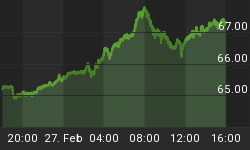Editor's Note: The following article discusses Robert Prechter's view of investment vehicles and government-regulated plans. For more analysis from Robert Prechter, download a free 10-page July issue of Prechter's Elliott Wave Theorist.
It's a blessing and a curse. IRAs, 401(k)s, thrift plans -- some of the best ways to save money for retirement (the blessing) can tie your hands when you invest that money (the curse). Most savers didn't recognize the cursed side as the markets generally trended up over the years, increasing their nest eggs' earnings. But after a year like 2008, savers everywhere absorbed the shock that they couldn't protect their retirement savings from a bear market. Now, the real moment of truth arrives: EWI forecasts that the market will again turn bearish. How can you protect what you've got when your plan doesn't have any options for short-side investing? Bob Prechter addresses that question in his most recent Theorist.
* * * * *
Excerpted from The Elliott Wave Theorist, by Robert Prechter, published August 5, 2009
Investment Vehicles and Government-Regulated Plans
We receive many emails from subscribers asking specific questions about investing [such as,] "Is it O.K. to invest in such-and-such short fund if that is my only short-side option?" Again, given the market-tracking mechanics of such funds, the only answer we can give in good conscience is "no." ... But every question prompts others. Why is this our friend's "only option"? The funds mentioned are the only ones in which a "long" is really a short, so we would guess that our friend has some sort of government-regulated retirement plan that allows only "long-side" purchases.
Others with retirement plans similarly complain that their plans do not include the option of owning Treasury-only paper and ask if such-and-such other money fund is safe enough to buy. In our view, most money funds assuredly do not offer the level of safety that we advocate. Moreover, such plans are often administered by brokers, and brokers will be in chaos during wave 3 down.
These questions reveal just some of the problems an investor encounters when playing the government's games. Conquer the Crash (see Ch. 23) recommended taking every opportunity to cash out of IRAs, Keoughs, company-provided plans, etc., all of which are government regulated, thereby freeing up your money so that you would have full say over its use.
By signing up for one of the government's "deals," a potential short seller now has no good choices and is therefore effectively barred from selling short. A prudent investor who wants to own the safest debt may likewise be barred from buying T-bills if he participates in a government-regulated, company retirement plan. Should he buy the only money fund available and cross his fingers? Government rules often force people into bad decisions. In this case, the "good deal" the government engineered for your retirement is a trap that prohibits you -- at the most important time in modern history -- from buying the safest debt instruments and from making money in a bear market....
Irony attends both financial markets and government plans. Put them together -- as we have witnessed throughout the financial crisis so far -- and you get Kafka.
For more analysis from Robert Prechter, download a FREE 10-page July issue of The Elliott Wave Theorist. It challenges current recovery hype with hard facts, independent analysis, and insightful charts. You'll find out why the worst is NOT over and what you can do to safeguard your financial future.















